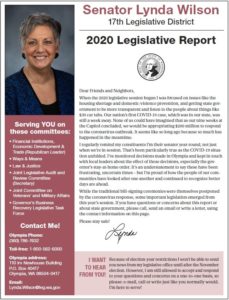Hello Friends and Neighbors,
There comes a point where legislators who are up for re-election are subject to certain limits on official communications, and it’s now right around the corner – so because I’ll be on the ballot in November, this will be my final e-newsletter until after the general election is certified.
Fortunately, the restrictions don’t affect my two-way communications with constituents. If you have a question or concern, I can still respond to email, letters and phone calls. Keep them coming!
“Stay Home, Stay Healthy” will put a huge hole in state budget: My interest in serving on the Senate Ways and Means Committee has been first and foremost about bringing my background in business and finance to the state budgeting process. It has also given me an early look at any proposed tax increases so I could alert my constituents. This week, however, being on the budget committee gave me an early look at something else: the effect of the COVID-19 shutdown on our state budget. It’s not good, and the people of our state – both as taxpayers and as “customers,” so to speak – need to know what may be coming.
As I mentioned in my previous e-newsletter, the state operating budget for 2019-21 covers two years at a time. The budget adjustments made this year brought the spending level to approximately $53.7 billion, which is up $8.8 billion from the previous budget (2017-19). An early estimate shared with our budget committee during a virtual meeting this week indicates a shortfall of $7 billion due to the pandemic response – and probably more.

You should soon receive my legislative report in the mail. If not, or to view it online, click here or on the image.
It quickly became clear after the governor’s stay-home proclamation that the resulting loss of economic activity was going to be hugely hard on the budget. Our state’s top three sources of tax revenue are construction, auto sales and food service/bars, in that order, and unlike his counterpart south of the Columbia River, Governor Inslee required all three to shut down.
The picture hasn’t changed much in the past six weeks: Construction is just now being allowed to resume on residential and private commercial projects already under way; auto sales were supposedly going to restart this week but are on hold because the governor’s team still didn’t have new safety regulations ready (after 5 weeks of negotiations!); and the food-service industry is on hold at least until June, and even then it’ll be at severely limited capacity.
The best-case scenario tied to the governor’s “phased approach” wouldn’t lift all the restrictions on business until mid-July, and he’s left himself a lot of room to have things take longer than the minimum 12 weeks already announced. I was encouraged that Governor Inslee will consider letting some counties reopen at a faster pace than others, but if he insists that a county must first go three weeks without a single new case of COVID-19, it could be a very long time before some of Washington’s more populated counties reach that mark.
I wasn’t in office in 2009, when a similar budget deficit was projected due to the Great Recession, but as a business owner I was keeping close track of the tax ideas that would end up being proposed as a partial remedy. Some were approved that year (and others were approved in 2010). In addition, Governor Inslee’s predecessor had to sign a budget that, among other things, cut funding to hospitals and nursing homes to serve Medicaid clients; cut people from state-subsidized health care; allowed an increase in college tuition; and eliminated thousands of taxpayer-supported jobs, including teachers.
The governor this week acknowledged the early financial forecast probably means the Legislature will have to come back to Olympia and look at the budget situation before our regular 2021 session (when a new budget for 2021-23 would have to be adopted). It would be heartless to pile more taxes onto families and employers while they’re trying to recover, so what does that leave for the governor and the majority side to propose but spending cuts? Education (over half of our budget) and social services account for the majority of state spending; it would be almost impossible to offset a $7+ billion deficit without touching either of those areas.
If the governor suddenly started trusting all Washington employers to protect their workers and customers the way the “essential” businesses have, and Washington’s economy was allowed to completely reopen tomorrow, it could only help to lessen the negative effect on those who benefit from state services. That isn’t going to happen, so we should expect the budget hole to get deeper than it is already. I hate to say it, but again, the people of our state deserve to know what may be coming.
Governor’s Economic Restart Task Force disbanded abruptly: I was one of eight legislators (two from each of the legislative caucuses) appointed in April to the Governor’s Business Recovery Legislative Task Force. Governor Inslee never spoke publicly about the existence of our group, and this week – at about the same time he was holding a news conference to announce the formation of three new advisory groups – our next meeting was abruptly canceled.
Yesterday his office informed us that the Legislative Task Force was being disbanded, after all of five meetings since April 17. No explanation was given. My guess is that we were asking too many challenging questions, on behalf of the people we represent.
The demise of our task force means the governor has no formal avenue for engaging with the Legislature regarding the state’s COVID-19 response. Also, the fact that he no longer sees value in having a regular dialogue with the legislative branch calls into question whether the situation still rises to the level of an “emergency.”
Without this group, our ability to influence the governor is pretty much limited to deciding whether to extend his proclamations, and I’m also finding that fewer and fewer of those are worth extending (as I’ve mentioned before, the stay-at-home proclamation is different from the others, and not subject to legislative approval). The whole thing is disappointing.
The story of the Tiffany Hill Act: Having been exposed to domestic violence when I was young, no piece of legislation has mattered to me like the Tiffany Hill Act – and six months ago, no one could have predicted how a Clark County mom of three and former Marine would become the driving force behind a new law that stands to improve the lives of countless victims of domestic violence.
This week I posted a short video (click here or on the photo to view) that tells the story of the Tiffany Hill Act and how the unwavering support of so many in the community – especially the members of “Team Tiffany” – made it possible. Like most laws created during the 2020 session the Tiffany Hill Act will take effect June 11, which is a month from Monday.
With Mother’s Day being the day after tomorrow, it makes me sad all over again to think about what happened to Tiffany and her children (and her mom, who was wounded in the same shooting). At the same time, I have to remember how the law named in her honor will give victims a chance to experience sense of peace and to finally stop looking over their shoulders.
With that, Happy Mother’s Day to all of you moms and grandmas, aunts and sisters! And while we all cannot celebrate our moms in person, we certainly can love and support them through virtual hugs.(and maybe even a video call 😊) The real-life hugs will happen soon!
I welcome your questions about state government and the decisions I make in the state Senate. Please call or e-mail — and stay safe!
Yours in service,
Here’s the basic set of wide-ranging online resources about the virus:
- Google.com front page — links to national and global information about COVID-19
- coronavirus.wa.gov — state government’s one-stop shop for information
- coronavirus.gov — the federal government’s one-stop shop
And some specifics:
- Coronavirus webpage — Clark County Public Health
- Information from the state Department of Health
- For you and your family
- Businesses and Employees











